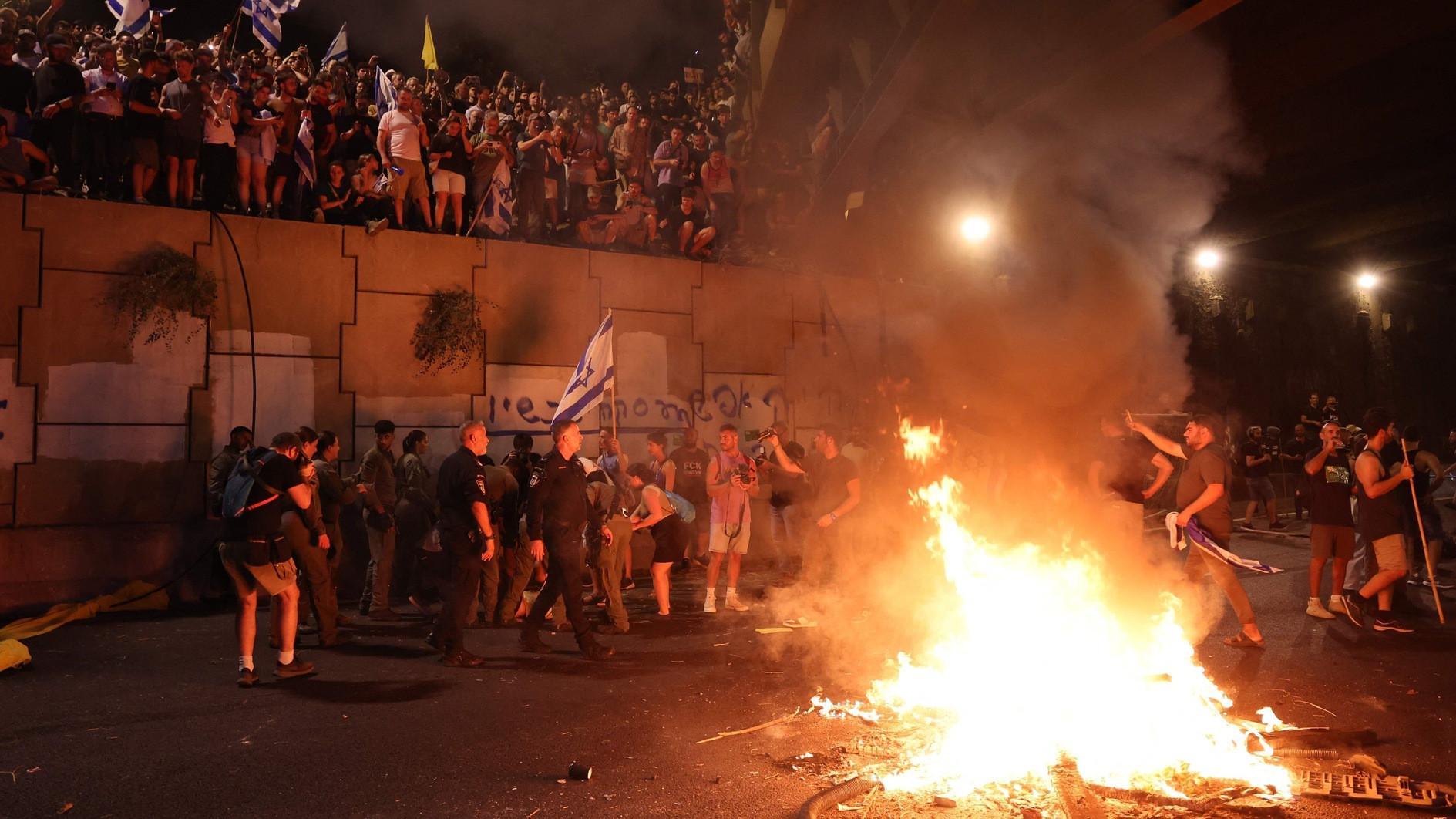
A strike on Monday called by Israel's largest labour union shuttered parts of the country to pressure the government into reaching a Gaza deal to free hostages, though several sectors were unaffected.
The Histadrut trade union called a nationwide strike beginning at 6:00 am (0300 GMT), a day after mass demonstrations following the army's announcement that troops had recovered the bodies of six hostages "murdered" in a Gaza tunnel.
The commercial hub of Tel Aviv and the northern coastal city of Haifa heeded the strike calls and announced municipal services would be closed Monday.
The Haifa port also slowed down or ceased some of its activities, Histadrut spokesman Peter Lerner said on social media platform X.
The Ben Gurion international airport near Tel Aviv saw some flights delayed, and none at all for two hours leading up to 10:00 am.
But not all municipalities joined the strike, like Jerusalem where light rail services were still cancelled in the morning.
Private-run public transportation services were at least partly functional at midday.
The public sector was also affected, with some services paused.
Israeli media said that upon request by Finance Minister Bezalel Smotrich - a far-right leader who opposes a truce - prosecutors asked a labour court to rule against the "political strike". A hearing is due later on Monday.
The call by Israel's largest union to paralyze the economy follows a night of massive demonstrations, with tens of thousands of protesters taking to the streets in an outpouring of grief and fury over six hostages killed in the Gaza Strip.
Israeli soldiers recovered the bodies of the six "from an underground tunnel in the Rafah area" of southern Gaza on Saturday, the military said.
Relatives and demonstrators accused the government of not doing enough to bring them back alive, and called for an immediate ceasefire to rescue the dozens still captive.
"We must stop the abandonment of the hostages... I have come to the conclusion that only our intervention can shake those who need to be shaken," said Histadrut union chair Arnon Bar-David.
"Starting tomorrow (Monday) at six in the morning, the entire Israeli economy will go on complete strike."
Of the 251 hostages seized during Hamas's Oct. 7 attack on Israel, 97 remain captive in Gaza, including 33 the army says are dead.
Scores were released during a one-week truce in November, with campaigners and family members believing another deal is the best option to ensure the rest return.
"We are asking our government to stop everything and to make a deal," Yair Keshet, uncle of hostage Yarden Bibas, said during Sunday night's protest in Tel Aviv.
Critics have accused Prime Minister Benjamin Netanyahu of prolonging the war for political gain.
"Were it not for the delays, sabotage, and excuses" in months of mediation efforts, the six hostages "would likely still be alive," campaign group the Hostages and Missing Families Forum said in a statement.
Six killed hostages
During protests that convulsed Tel Aviv Sunday night, demonstrators marched past six symbolic coffins draped with the Israeli flag and carried pictures of the deceased hostages.
A handful of protesters clashed with police while some burned tires on a blocked highway where they defied water cannon.
The six hostages were identified as Carmel Gat, Eden Yerushalmi, Almog Sarusi, Ori Danino, U.S.-Israeli Hersh Goldberg-Polin, and Russian-Israeli Alexander Lobanov.
Qatar-based Hamas official Izzat al-Rishq said they were "killed by Zionist (Israeli) bombing," an accusation the military denied.
A senior Hamas official told AFP on condition of anonymity that "some" of the six had been "approved" for release in a potential hostage-prisoner swap under a deal yet to be agreed.
U.S. President Joe Biden said he was "devastated and outraged" by the hostages' deaths but "still optimistic" about sealing a ceasefire deal.
The Biden administration has been leading mediation efforts along with Qatar and Egypt.
Polio vaccinations
In the besieged Gaza Strip, rescuers were digging through rubble for people buried alive by Israeli strikes on a school sheltering displaced people in Gaza City.
Civil defense agency spokesperson Mahmud Bassal told AFP that Sunday's strike on the Safad School killed 11 people.
Israel's military said it had hit a Hamas command center.
Nearly 11 months of war have flattened much of Gaza and destroyed its water, sanitation, and medical facilities, contributing to the spread of preventable diseases.
Across Gaza, a series of "humanitarian pauses" are expected to facilitate a vaccination drive after the first confirmed polio case in 25 years.
The vaccination campaign formally launched on Sunday at three health centers in central Gaza, according to Yasser Shaaban, director of Al-Awda hospital.
Philippe Lazzarini, head of the UN's Palestinian refugee agency, called it a "race against time to reach just over 600,000 children."
"For this to work, parties to the conflict must respect the temporary area pauses," he posted on social media.
The war was triggered by Hamas's Oct. 7 attack, which resulted in the deaths of 1,205 people, mostly civilians, according to an AFP tally based on Israeli official figures.
Israel's retaliatory military campaign has killed at least 40,738 people in Gaza, according to the Hamas-run territory's health ministry. The UN rights office says most of the dead are women and children.
Out of 251 hostages seized by Palestinian militants in their attack, 105 remain in Gaza, including 34 the Israeli military says are dead.